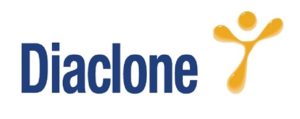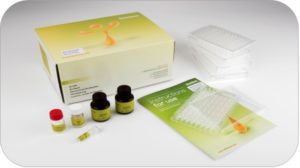 Immunotherapies such as monoclonal antibodies, bispecific antibodies (Bi-specific T-cell engagers or BiTEs) and adoptive T-cell therapies (e.g. CAR-modified T-cell) have provided great advances in cancer treatment. However, testing new therapies is not without risk.
Immunotherapies such as monoclonal antibodies, bispecific antibodies (Bi-specific T-cell engagers or BiTEs) and adoptive T-cell therapies (e.g. CAR-modified T-cell) have provided great advances in cancer treatment. However, testing new therapies is not without risk.
The most common and potentially severe toxicity seen across trials using immunotherapies is Cytokine Release Syndrome (CRS). Understanding CRS is therefore of paramount importance when developing new immunotherapies.
Read on to learn more about CRS, and how Diaclone can help to detect cytokines engaged in CRS.
What does CRS mean?
CRS stands for Cytokine Release Syndrome. Cytokine Release Syndrome is a clinical syndrome resulting from generalised immune activation correlating with marked elevations of serum inflammatory markers and cytokines. The first clinical signs of CRS are fevers, myalgias, and fatigue. Starting from fever with or without constitutional symptoms (CRS grade #1), symptoms can rapidly evolve to hypoxia requiring O2 (grade #3) and finally death (grade #5).
Probability of CRS events
The risk of CRS is influenced by factors related to the type of therapy, underlying disease, and characteristics of the patient. Treatment with most conventional monoclonal antibodies carries a relatively low risk of CRS, whereas CAR-T therapies carry a significantly higher risk of CRS incidence.
As an example, the recently approved CAR-T therapy YESCARTA® (axicabtagene ciloleucel) was studied in 107 adults with large B cell lymphoma and ninety-four percent of treated patients developed CRS and 12% developed grade ≥3 CRS.
KYMRIAH® (tisagenlecleucel) was tested in 68 paediatric and young adult patients with relapsed/refractory ALL and seventy-nine percent developed CRS with 49% developing grade ≥3 CRS.
What can be done when CRS occurs?
Corticosteroids may be necessary in some cases, but in high doses have proven to have a detrimental effect on CARTs.
Extracorporeal blood purification techniques, such as high-volume hemofiltration, cascade hemofiltration, plasma exchange, and coupled plasma filtration adsorption, have also been reported as a potential alternative to treat CRS syndrome. But they remain time consuming and labour extensive solutions.
Since the initial observation that tocilizumab, an antibody against the IL-6 receptor, rapidly reversed severe CRS, the drug remains at the forefront of CRS treatment.
For the future, many CARTs in development incorporate suicide targets as methods to mitigate toxicity.
Another approach is manufacturing CARTs that can be regulated without actually killing them, for example requiring infusion of an additional agent for activation.
Early detection is better than treatment
Early prediction is necessary as the side effects appear rapidly (within 1-2 weeks) following CAR-T infusion. The elevation of the signature set of 24 different cytokines is then an interesting and crucial measure to monitor in patients.
The main cytokines implicated in the pathogenesis of CRS include effector cytokines released from activated T cells, but also cytokines mainly secreted by monocytes and macrophages. IFN-γ and sgp130 levels, for example, rise early and their elevation is different for severe versus non-severe CRS.
But we can also mention sIL6R, interleukin-6 (IL-6), interleukin-10 (IL-10), interferon IFN-α, chemokines that are chemotactic for monocytes/macrophages (MCP1, MIP1α, MIP1β), granulocytemacrophage colony-stimulating factor (GM-CSF), but also TNF-α, IL-1b, IL1RA, IL-2, sIL2Rα, C-reactive protein (CRP) and IL-8. Other biomarkers of endothelial cell activation, such as Angiopoietin-2 and von Willebrand factor, have also been recently described to predict CRS severity.
Detect cytokines engaged in CRS with Diaclone
 In order to effectively monitor the risk linked to immunotherapy, Diaclone has developed a large panel of standard recombinant cytokines and monoclonal antibodies targeting specific cytokines engaged in Cytokine Release Syndrome, as well as ELISA, ELISpot, and DIAplex kits.
In order to effectively monitor the risk linked to immunotherapy, Diaclone has developed a large panel of standard recombinant cytokines and monoclonal antibodies targeting specific cytokines engaged in Cytokine Release Syndrome, as well as ELISA, ELISpot, and DIAplex kits.
As a first evaluation test, and for 7 of the targeted set of cytokines, Diaclone DIAplex is a particularly useful tool for providing a rapid response and with a reduced sample volume requirement starting from only a few µl.
Want to know more about these products for your specific immuno-assay?
View all Cytokine Products from Diaclone
Diaclone – “Excellence in Immunoassay Development”
With over 30 years of experience and expertise, Diaclone has been established as a centre of excellence in Monoclonal Antibody research and Immunoassay Kit development.
Robust manufacturing procedures coupled to in-house mAb development ensures excellent Batch to batch consistency of Diaclone’s ELISAs, ELISpot and Multiplex kits. Other advantages include:
- Highly specific kits available (human, mouse and rat proteins)
- Analyte detection in Plasma, serum and cell culture
- >1000 immunoassay kits: for targets such as Cytokines, Cytokine Receptors, CD Markers, Cell Adhesion, Apoptosis…
- Multiple kit formats for greater flexibility
- “Discover Diaclone” – trial sizes available
- Custom and Bulk manufacture available
- High sensitivity formats available
- Specific Kits and antibodies CE labelled for IVD use in EU
- Kit controls and NIBSC calibration where available
Diaclone products are distributed in the UK and Ireland by Caltag Medsystems Ltd.
